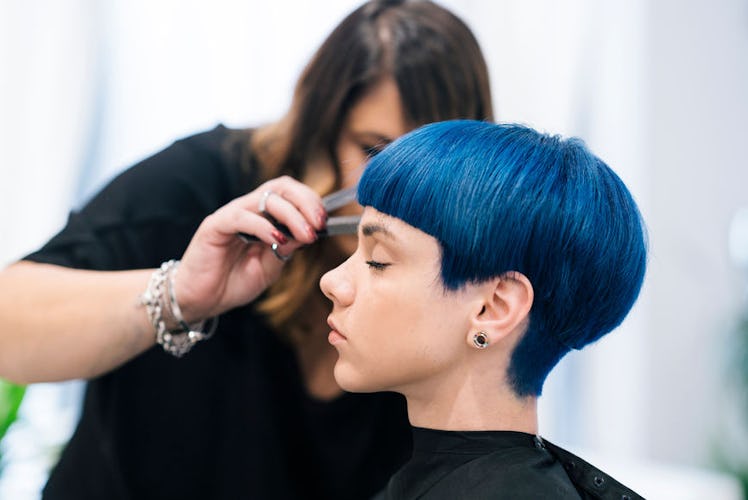
Here's How To Tell When You *Actually* Need A Haircut, According To Hairstylists
Whether you consider your regular hairstylist to be your part-time therapist or you’re just visiting a salon for the first time, figuring out how to tell when you need a haircut can be tricky. Haircuts can be pricey and time-consuming, and if you don’t actually need to spend an hour or more under the scissors, why waste the time and money?
On the other hand, many of us should probably be going to a hairdresser for a little chop more often, since walking around with limp, damaged hair doesn't really help anyone. Plus, I’ve never had a cut or trim and walked away thinking, “Did I really need that?” The answer can always be found in the extra pep in my step, beaming smile, and countless selfies — yes, I did need that trim.
If you’re unsure about when you need to get a haircut, turn to the three stylists I interviewed below and look out for these telltale signs a haircut is necessary before booking your next appointment.
You’ve Got Split Ends
Arguably the most obvious of the signs you need a salon visit, split ends are a huge indicator that you need to at least get a trim. “Split or compromised ends will only continue to split or break, unless they are properly cut,” says Paul Cucinello, celebrity stylist and owner of Cucinello Studio in NYC. “This isn’t the time to sit down with tiny scissors and cut each individual strand yourself; it’s time to seek professional help — from your stylist.”
You don’t have to use a microscope to find split ends. In fact, according to the pros, they might be pretty easy to spot. “When your ends are splitting and they look lighter than the rest of the hair, it’s definitely time for a cut,” says Davide Marinelli, owner of Davide Hair Studio in NYC.
Treating split ends is next to impossible (other than by chopping them off), but preventing them from occurring and reoccurring is possible. “The best way to avoid them is to trim the ends of your hair regularly, always use heat protection, and however much your budget can afford, upgrade your styling tools,” says Cucinello. Spornette Italian Rounder Brushes ($26, amazon.com) are his secret weapon, and Cucinello believes top-quality, natural, boar hair bristle brushes will create less friction and help keep hair smoother and shinier, with less damage to the hair than other brushes.
Your Hair Appears Dull, Limp And/Or Shapeless
A good time for a haircut is when your locks are lack shine, especially at the ends where the hair is older and your natural scalp oils can’t reach. Additionally, “flatness at the roots and no volume is a sign of a grown-out haircut,” says Eloise Cheung, a hair stylist based in NYC. “The length of the hair adds weight, which makes it harder to maintain volume in the hair, especially at the roots.” If you're someone who lives for lots of volume, then either the shape of your cut needs to be adjusted or a few layers need to be added for your desired style to be more easily achieved.
Your Hair Won’t Bend Or Curl With A Hot Tool
If you can’t put a bend or a curl on the ends of your hair with a hair curler, it’s a sign that you may need to get into the salon soon for a cut. “Hair needs moisture to create shape and shine, and if you don’t have healthy hair, you won’t get any shape,” says Marinelli.
Your Hair Gets Easily Knotted And Tangled
If your ends are getting easily tangled and knotted together, consider it time to go in for a trim, says Cheung: “The ends of the hair are the oldest, so they are the most susceptible to damage."
You Haven't Gotten Your Hair Cut In A Really Long Time
OK, OK, so if you love and feel good about the way your hair is, then obviously disregard this sign. However, if you’ve never had the courage to change your 'do, but you've wanted to in the past, consider this your push to do it! “Most people don’t like change, and I truly believe that’s because change is usually something that happens to you,” explains Cucinello. “Changing your hairstyle is one of the best ways to get used to change, and it can be one of the most transformative and positive changes you can impose upon yourself.”
As far as a set timeline goes, there aren't necessarily hard and fast rules. However, Cucinello has a few professional guidelines. In general, to maintain a specific length, your hair should be trimmed every four to six weeks. If you’re keeping shorter styles fresh or the perimeter of a bob sharp, the edges can be trimmed every four to six weeks as well. However, if you want to maintain long hair, Cucinello recommends trimming it every three to four months so you keep the length.
In fact, unless your ends are damaged, there’s no benefit to cutting short hair while you’re trying to grow it out: “The truth is, cutting your hair will only make it shorter, so if you’re trying to grow out a bob, wait until it’s long enough to add some layers or try some bangs for a change.”
This article was originally published on